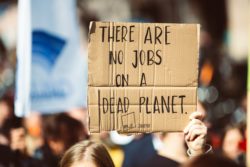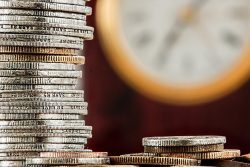By Robin Struber, PhD student, Business School COP28 is coming to an end just at the festive season begins. With the climate emergency back in the spotlight, does this mean more of us are opting for a vegan Christmas? It doesn’t look that way. While national institutions are discussing ways to gradually ‘phase out’ emissions, … Continue reading “COP28 ends and the festive season begins – will it be a vegan Christmas?”
Category: Sustainability
Are climate-related financial disclosures making a difference to business behaviour or the climate?
By Dr Mayya Konovalova & Dr Salma Ashour, Department of Accounting In his speech in Dubai, Chair of the IFRS Foundation Trustees, Erkki Liikanen, announced that COP28 marks the official end of the work of the Task Force on Climate-Related Financial Disclosures (TCFD). This achievement is hailed as a key milestone in information sharing, potentially … Continue reading “Are climate-related financial disclosures making a difference to business behaviour or the climate?”
How can accountants help to stabilise the climate and drive nature recovery?
By Professor Thomas Cuckston, Professor of Accounting and Ecology – Birmingham Business School Climate change and nature loss are urgent global crises threatening our societies. Humanity must find a way to transition from a global economy that drives climate change and nature loss to one that stabilises the climate and drives nature recovery. International initiatives … Continue reading “How can accountants help to stabilise the climate and drive nature recovery?”
What impact does the Which? annual rankings of the greenest supermarkets have on consumer behaviour?
By Dr Jennifer TyreeHageman Lecturer in Responsible Business, University of Birmingham In February, the consumer association Which? released its annual rankings of the greenest supermarkets. The ranking system uses three metrics to measure the environmental sustainability of supermarkets: greenhouse gas emissions, plastic usage and food waste generated by the supermarkets. It was good news for … Continue reading “What impact does the Which? annual rankings of the greenest supermarkets have on consumer behaviour?”
The UN’s Sustainable Development Goals and the wealth of nations
By Professor Sir Partha Dasgupta University of Cambridge In September 2015, the United Nations General Assembly agreed on an agenda for sustainable development in member countries. Nations committed themselves to meet 17 Sustainable Development Goals (SDGs), involving 169 socio-economic targets, by the year 2030. To measure progress in meeting those targets, it was proposed to … Continue reading “The UN’s Sustainable Development Goals and the wealth of nations”
Is recycling crisp packets enough for Walkers to become a responsible business?
By Dr Roshan Boojihawon, Senior Lecturer in Strategy Department of Strategy and International Business, University of Birmingham After its recent decision to make recyclable crisp packets in response to mounting pressure from its consumers, Walkers seems to have become known as the ‘responsible’ crisp manufacturer. Although some see this as a responsible move, I would … Continue reading “Is recycling crisp packets enough for Walkers to become a responsible business?”
Responsible business, Sustainable Development Goals and trading fairly
By Professor Ian Thomson, Professor of Accounting and Sustainability, Lloyds Banking Group Centre for Responsible Business Centre Director Department of Accounting, University of Birmingham We need to recognise that our personal pleasure from an unfairly traded product, such as coffee or chocolate, results in increased poverty for many. The value of trading fairly is often underestimated, the … Continue reading “Responsible business, Sustainable Development Goals and trading fairly”
Is corporate wellness an indicator of responsible business?
By Dr Geraint Harvey, Senior Lecturer in HRM and Industrial Relations, Lloyds Banking Group Centre for Responsible Business Associate Department of Management, University of Birmingham scholars have called for businesses to not focus on new health initiatives, but on more established aspects of human resource management that give workers the tools to live healthier lives. … Continue reading “Is corporate wellness an indicator of responsible business?”
Responsible business, time travel and intergenerational equity
By Professor Ian Thomson, Professor of Accounting and Sustainability, Lloyds Banking Group Centre for Responsible Business Centre Director Department of Accounting, University of Birmingham There is an implicit social contract between generations that requires businesses to consider justice across time. Businesses enable time travel; distributing costs, benefits, risks, liabilities and possibilities backwards and forwards through time and … Continue reading “Responsible business, time travel and intergenerational equity”
Resource orchestration for sustainable entrepreneurship: multiple actors’ perspective
To celebrate Responsible Business Week we will be posting a series of blogs on this topic. In this post, Senior Lecturer Dr. Natalia Vershinina and Research Fellow Dr. Vivek Soundararajan tackle sustainable entrepreneurship. We are living in the age, when climate change is accelerated by collective human activity, which includes irresponsible business activity. We seem to think that … Continue reading “Resource orchestration for sustainable entrepreneurship: multiple actors’ perspective”










